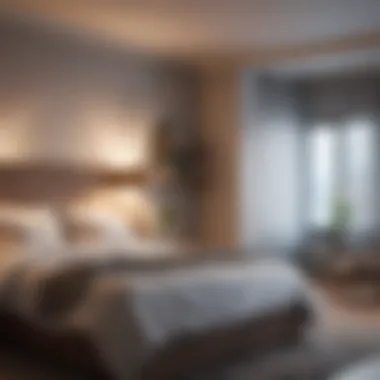Is Sleeping Naked Healthy for You? Exploring the Benefits


Intro
The practice of sleeping naked raises several questions about health and well-being. People often wonder if there are real health benefits or notable downsides to this habit. Recent discussions focus on several dimensions, including skin health, sleep quality, and even psychological impacts. It is essential to unpack these dimensions to understand the overall implications of choosing to sleep without clothes.
Understanding the nuances of this practice is vital, particularly for health professionals and other wellness experts. Research indicates that the choice to sleep naked influences various aspects of health and personal relationships. Therefore, an informed perspective can assist in helping individuals align their nighttime habits with their health goals.
Key Takeaways
- Sleeping naked can enhance skin health by allowing the skin to breathe, potentially reducing the risk of skin irritations.
- Practicing this can facilitate better sleep quality, as it maintains an optimal body temperature conducive to restful sleep.
- This practice encourages open communication and intimacy in relationships, as nudity can enhance emotional bonding.
- Psychological benefits include a sense of freedom and comfort, which may positively impact self-esteem.
Key statistics
- A survey conducted by the National Sleep Foundation revealed that nearly 12% of adults report sleeping in the nude.
- Research shows that cooler sleeping environments can increase time spent in the REM sleep stage, which is known for its restorative benefits.
Practical Tips
- Assess Your Environment: Ensure the bedroom is conducive for sleeping naked. A comfortable mattress and bedding support a better night's rest.
- Start Gradually: If you are new to this practice, consider sleeping without clothes for part of the night. This can help you adjust comfortably.
- Mind the Temperature: Ensure that your sleeping space is not too cold or too hot. Body temperature regulation is crucial for comfort and sleep quality.
- Maintain Hygiene: Regularly wash bedding and keep the sleeping environment clean to prevent skin irritations.
Intro to Sleeping Naked
Sleeping without clothing has become a topic of interest, often provoking curiosity and debate. This article aims to highlight the significance of sleeping naked as a practice that relates to health, comfort, and well-being. By analyzing various aspects, such as cultural norms, historical perspective, and potential benefits, we can better understand the implications of this practice.
Considering how sleeping naked can affect physical health and mental well-being is crucial. The choice to sleep without sleepwear can influence factors like skin health, sleep quality, and temperature regulation, which are essential for overall wellness. People often engage in this practice for its perceived benefits, both physical and psychological.
It's important to acknowledge that societal and personal factors can shape attitudes towards nudity. As we explore these cultural attitudes, we will uncover how perceptions of nudity influence individuals in their decision to sleep naked. This awareness contributes to understanding not just personal preferences but also broader societal norms that dictate comfort with nudity in various contexts.
Furthermore, historical context informs current practices. The evolution of sleepwear, alongside changing cultural attitudes toward nudity and modesty, illustrates how our views can adapt and shift over time. Understanding this history may allow individuals to reflect on their practices today and how these practices relate to personal comfort and health goals. This article will explore these themes in greater detail, aiming to provide a thorough examination of whether sleeping naked can be a healthy lifestyle choice.
Potential Health Benefits
The practice of sleeping naked has gained attention in recent years, and it is essential to understand the potential health benefits that come with this choice. Embracing this lifestyle may not only improve sleep quality but also enhance skin health and regulate body temperature. Each of these factors contributes to overall well-being and can impact individual health goals. This section delves into several critical aspects, considering how they intersect with various physiological and psychological needs.
Enhancing Sleep Quality
One key benefit of sleeping without clothes is the potential improvement in sleep quality. The body temperature plays a crucial role in achieving deeper sleep cycles. When people sleep dressed, especially in tight or heavy clothing, it can lead to fluctuations in body temperature. Such fluctuations often result in disruptions during sleep. Naked sleeping can promote a more stable and comfortable temperature, allowing individuals to experience more restorative sleep phases.
Promoting Skin Health


Sleeping naked also has significant benefits for skin health. This aspect consists of two critical components:
Temperature Regulation and Skin Conditions
Temperature regulation is vital for maintaining skin health. When the body remains at an optimal temperature during sleep, it can help prevent overheating, which is a common culprit for skin conditions such as eczema and acne. The key characteristic of temperature regulation is its ability to reduce inflammation, leading to healthier skin.
By not wearing pajamas, the skin can breathe easily, minimizing sweat accumulation. This can deter bacterial growth, which often exacerbates skin issues. Hence, sleeping naked promotes overall skin wellness, making it a desirable choice for many individuals interested in maintaining skin health while sleeping.
Breathability and Skin Health
The breathability of skin is equally important. When it is exposed to air, it allows for better airflow. This can significantly impact moisture regulation and hygiene. The key characteristic of breathability lies in its ability to keep skin drier and more comfortable throughout the night. By opting for a clothing-free sleep experience, one can reduce the risk of skin irritations and rashes caused by synthetic materials often found in sleepwear.
Moreover, the unique feature of enhanced breathability contributes to a more relaxed sleep environment. People may find that this choice leads to fewer skin complaints, thus supporting their health goals. While this approach has advantages, it is essential to consider personal preferences and environmental factors, as comfort varies from person to person.
Impact on Body Temperature Regulation
With sleep being intrinsically linked to body temperature regulation, choosing to sleep naked enables the body to manage temperatures more effectively. Individuals are generally more aware of their warmth levels, which helps them adjust when necessary—feeling too hot or too cold when covered may make one restless at night. The practice of sleeping without clothing, therefore, offers a practical solution to advocate for better sleep hygiene.
Boosting Relationship Dynamics
Finally, sleeping naked may also foster improved relationship dynamics. Physical intimacy can be enhanced, as closeness often becomes more spontaneous and accessible. Being naked promotes a sense of vulnerability and openness, which can lead to increased emotional connection. Being comfortable with one’s body in the presence of a partner can facilitate stronger relationships, highlighting the importance of comfortable sleep environments not only for personal well-being but also for interpersonal connections.
Potential Drawbacks
While the practice of sleeping naked may offer various health benefits, it is essential to consider potential drawbacks that could impact individual choices. Understanding these downsides allows one to make an informed decision based on personal situations and preferences.
Concerns About Privacy and Security
One critical aspect of sleeping naked is the perception of privacy. For many, the idea of being unclothed while resting can induce feelings of vulnerability. In shared living spaces, this concern can escalate significantly. Individuals may worry about unexpected visits from roommates, family members, or even pets. The psychological impact of these worries can hinder relaxation and, consequently, sleep quality. Consideration of one’s environment is vital. For those who live alone or in a secure setting, nudity while sleeping may bring freedom and comfort. However, establishing boundaries in a shared space is crucial for personal peace during sleep.
Temperature Sensitivity
Climate Considerations
The climate where one resides plays a substantial role in deciding whether to sleep naked or not. In warmer climates, reduced clothing can facilitate better air circulation, helping the body remain cool through the night. This is particularly beneficial during hot summer months when the body temperature needs regulation. The unique aspect of warmer environments is how they can enhance comfort while sleeping.
Nonetheless, there are potential disadvantages. In areas where night temperatures drop significantly, it may become uncomfortable or even cold to sleep without covers. Those living in temperate climates may find a balance by ensuring proper bedding materials. A lightweight blanket can help maintain comfort without overheating. Understanding these residential climate factors can influence the decision to sleep naked.
Seasonal Effects on Sleep


Seasons can directly impact the decision to sleep unclothed. During summer, the warmth often supports the practice and encourages an easy transition into sleep without the need for restrictive clothing. Conversely, winter presents challenges. Cold temperatures can lead to discomfort. The ability to regulate body warmth may become a factor. Covering oneself adequately while trying to maintain ease may require a reconsideration of nudity in winter months.
People may need to adapt their sleeping habits based on seasonal changes. For instance, wearing lighter sleepwear during colder seasons can be a compromise. Finding the right balance is important as well as maintaining the overall goal of improved sleep quality.
Hygiene Considerations
Hygiene is a significant factor when discussing the advantages and disadvantages of sleeping naked. There is a debate on how body oils and sweat interact with bed linens. Proponents suggest that without the barrier of clothing, skin can breathe better, promoting healthier skin. However, there is a trade-off. Body fluids and oils might accumulate on sheets and bedding, requiring more frequent laundering.
Maintaining cleanliness in sleeping environments is paramount. Regular washing of sheets can alleviate some hygiene concerns associated with sleeping nude. Choosing breathable linens can also enhance comfort. These considerations relate closely to health and well-being, assuring a practical and safe sleeping environment.
Psychological Perspectives
Understanding the psychological aspects of sleeping naked is crucial for evaluating its overall health benefits. This practice can stimulate a range of emotional and mental responses, influencing feelings of self-acceptance, stress levels, and anxiety management. By recognizing the psychological perspectives, one can better assess how sleeping without clothing may align with personal wellness goals.
Body Image and Self-Acceptance
Sleeping naked encourages a direct encounter with one’s own body. This experience can foster acceptance, revealing a deeper relationship with self-image. People often grapple with societal standards of beauty, leading to negative thoughts about their bodies. By choosing to sleep naked, individuals may begin to embrace their natural form.
Several studies suggest that body acceptance can enhance self-esteem. When individuals accept their bodies, it can lead to a more positive self-concept. Those who engage in activities that celebrate their bodies may find it easier to let go of insecurities. Hence, sleeping naked serves as a small yet effective step towards achieving self-acceptance.
Awareness of one's body can improve mental health. People who are comfortable with their skin tend to report lower levels of anxiety and depression. Additionally, feeling comfortable being naked can break down societal barriers and expectations, allowing for a more authentic self-expression.
Effect on Stress and Anxiety Levels
The act of sleeping naked may also contribute positively to stress and anxiety levels. Comfort is linked to how we sleep, and having fewer barriers between oneself and the environment can feel liberating. When individuals sleep in less restrictive clothing, they may experience better sleep quality and, in turn, lower anxiety levels.
Research has shown that adequate sleep is fundamental to emotional regulation. Poor sleep can exacerbate stress and other mental health issues. By sleeping naked, one may enhance comfort and, therefore, the quality of sleep achieved. Better sleep contributes directly to reduced stress responses.
Moreover, skin-on-skin contact, especially when shared with a partner, can release oxytocin. Often called the “love hormone,” oxytocin fosters feelings of connection and security, reducing feelings of anxiety. This physiological response underscores the need for intimacy and its impact on mental well-being.
Practical Considerations
Understanding practical considerations around sleeping naked is essential for evaluating this lifestyle choice. It involves examining various aspects that can influence one's experience and well-being while engaging in this practice. Creating a comfortable sleep environment, and recognizing personal comfort and preferences, play significant roles in determining whether sleeping without clothes is suitable for each individual.
Creating a Suitable Sleep Environment
A conducive sleep environment is vital to achieving restful sleep. This requirement becomes even more pronounced when considering sleeping naked. The room temperature should be regulated to promote comfort. Studies suggest that a cooler environment often enhances sleep quality. Aim for a temperature between 60 to 67 degrees Fahrenheit.
Furthermore, consider the bedding material. Natural fibers like cotton or linen allow for better airflow, which can prevent overheating during the night. Investing in quality sheets contributes not only to comfort but also impacts skin health. If one sleeps naked, it is wise to select breathable fabrics that reduce the risk of skin irritation or excessive sweating.


Another element of a favorable sleep environment is adequate privacy. This is particularly crucial for individuals who may feel anxious about being unclothed while sleeping. Creating a serene and secure space can foster a sense of ease, leading to improved relaxation and a better night's sleep. Soundproofing the room with heavy drapes can also minimize disturbances from external noise, further aiding in sleep quality.
Personal Comfort and Preference
Comfort is subjective, and personal preferences differ significantly. Some individuals may find sleeping naked liberating, while others might feel exposed or anxious. It is important to listen to one's body and emotions when making this decision. Engaging in a brief test period can be useful. Individuals can try going without sleepwear for a few nights to assess feelings and sleep quality.
Factors such as skin sensitivity and personal body temperature at night could influence this practice. For instance, people who tend to feel cold at night might not find it comfortable to sleep naked in cooler seasons.
Considerations include:
- Individual comfort with nudity
- Historical and cultural influences
- Skin conditions or sensitivities
End and Personal Reflection
In assessing the topic of sleeping naked, it becomes clear that individual choices play a significant role in determining overall health and wellness. The conclusion section reflects on the multitude of factors that inform this personal practice. While there are distinct health benefits associated with this lifestyle choice, such as improved sleep quality, enhanced skin health, and positive psychological effects, individual circumstances must be considered. Embracing nudity during sleep may offer advantages, but it is essential to recognize the unique needs and preferences of each person.
For many, sleeping without clothing can enhance the quality of sleep through increased comfort and body temperature regulation. Yet, there are drawbacks that deserve consideration, including concerns related to privacy, temperature sensitivity, and hygiene.
Individual health is influenced by diverse elements, including personal beliefs, lifestyle, and environmental factors. As such, sleep is a deeply personal experience. What benefits one person may not necessarily hold true for another.
*
"Ultimately, the choice to sleep naked hinges upon personal comfort, health needs, and psychological well-being."
*
Moreover, understanding the psychological implications is crucial. Body image and self-acceptance perspectives can shape one’s willingness to engage in this practice. Thus, a careful reflection on these factors and their relation to personal choices is imperative for readers contemplating this lifestyle change.
Individual Choices and Health
The decision to sleep naked is influenced by a variety of health factors and personal preferences. Some individuals report heightened comfort and relaxation when not confined by sleepwear. This feeling may contribute to more restful sleep, promoting overall well-being.
Health professionals often point to these elements:
- Enhanced Airflow: Allowing the body to breathe freely may reduce skin irritations and certain dermatological issues.
- Temperature Regulation: Sleeping without clothing might help stabilize body temperature, promoting deeper sleep cycles.
- Body Awareness: Embracing one’s natural body can aid in fostering a sense of acceptance and self-esteem.
Overall, it becomes evident that individual choices should be honored. Tailoring one’s sleep habits according to personal health requirements is essential.
Recommendations for Sleep Practices
To maximize the benefits of sleeping naked, certain recommendations can aid in developing effective sleep practices:
- Assess Your Environment: Ensure your bedroom is cool and comfortable. A favorable room temperature can enhance the benefits of sleeping without clothing.
- Evaluate Personal Comfort: Ensure that bedding material feels right against your skin. Soft and breathable fabrics may improve the naked sleeping experience.
- Understand Seasonal Variations: Adjust clothing habits through seasons. Experimenting between wearing barely anything to lightweight fabrics in cooler months might balance comfort and warmth.
- Maintain Hygiene: Regular washing of bedding and keeping the sleeping area clean can promote skin health and comfort.
In summary, combining personal comfort with healthy practices can create a better sleeping experience. Each person's journey in evaluating the benefits of sleeping naked is unique, necessitating reflection and adaptation to personal preferences and health. This conscientious approach will lead to informed choices in the pursuit of better health through sleep.







